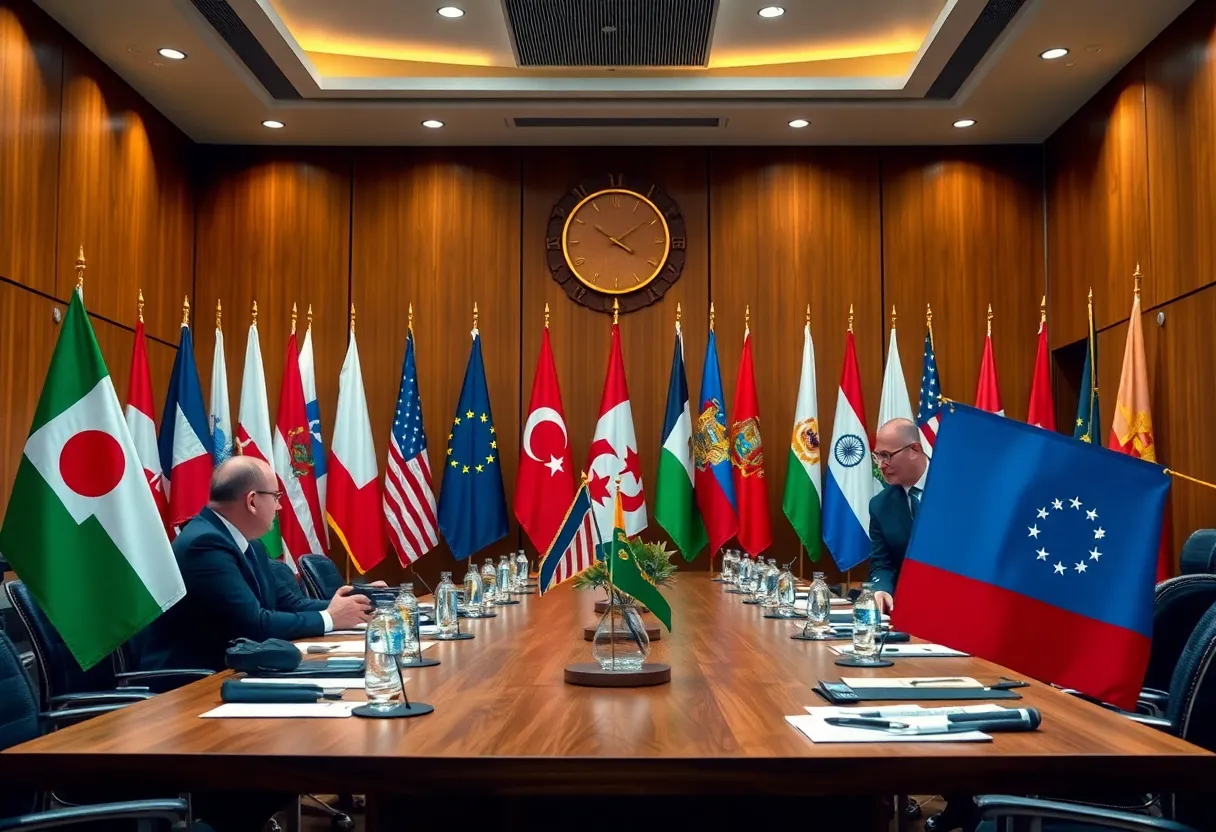News Summary
The United States has exercised its veto power against a U.N. Security Council resolution proposing a cease-fire in Gaza, amidst growing humanitarian needs. With 14 votes in favor, the U.S. stands as a dissenting voice, emphasizing Israel’s right to defend itself while blocking multiple cease-fire proposals. This action highlights a broader trend of U.S. support for Israel, raising concerns about the humanitarian crisis in the region and the increasing isolation of the U.S. within international discussions.
U.S. Vetoes U.N. Resolution for Gaza Cease-Fire
In a significant move that has made waves around the globe, the United States recently exercised its veto power against a U.N. Security Council resolution aimed at establishing a cease-fire in Gaza. This resolution, which had garnered an impressive 14 votes in favor, was met with a firm “no” from the U.S., marking its position as one of the only dissenters in the room.
What Was the Resolution About?
The resolution called for an **immediate and unconditional cease-fire** in the ongoing conflict between Israel and Hamas. It went beyond just stopping the violence; it also sought to ensure the **release of all hostages** and the **resumption of full-scale humanitarian aid deliveries** to the people affected by the conflict in Gaza. In essence, it aimed to protect civilians and restore vital support channels during a critical period.
The Context of the Veto
This veto marked a first for the current context of the Israel-Hamas conflict, as it was the first time the Security Council considered a cease-fire resolution since the onset of the war, which began on October 7, 2023. The urgency of the situation in Gaza has been escalating, with humanitarian needs reaching alarming levels. The veto by the U.S. underscored a growing sense of **isolation** as it continues to extend **unconditional support** to Israel during this tumultuous period.
Why Did the U.S. Vote This Way?
The U.S. representative at the U.N. defended the decision by reiterating that Israel has the right to defend itself. During discussions, the U.S. pointed fingers at Hamas, emphasizing that the group is primarily responsible for the suffering of Palestinians, thereby framing its military support for Israel as a necessary response to an untenable situation.
What Happened After the Vote?
Following the resolution’s defeat, the ten nonpermanent members of the Council, who had proposed the resolution, expressed disappointment. They noted that the majority recognized the need for an immediate halt to hostilities and called for unhindered access to humanitarian aid for civilians caught in the chaos. Unfortunately, for a decision to pass in the Security Council, it requires **nine votes in favor** and no vetoes from any of the five permanent members—namely the U.S., U.K., France, Russia, and China.
How Many Resolutions Have Been Vetoed?
Since the conflict’s eruption, the U.S. has not only vetoed this most recent resolution but has also blocked **three other cease-fire proposals**, while opting to **abstain from one**. This pattern suggests a solid commitment to backing Israel and has raised eyebrows and concerns about the humanitarian situation unfolding in Gaza.
The Bigger Picture
The constant military actions in Gaza paint a grim picture for civilians, who are in dire need of assistance. The U.S.’s stance continues to spark discussions and debates about the role of major players in international conflict resolutions, particularly in one of the world’s most volatile regions. While the U.S. insists it is protecting Israel’s interests, many are left wondering about the cost to innocent lives and the urgent need for humanitarian aid.
Looking Ahead
The path forward seems complex, with both sides entrenched in their positions. As the world watches, the pressure mounts for a solution that prioritizes peace and humanitarian aid. It remains to be seen how this situation will unfold, but one thing is clear: the need for dialogue and a commitment to safeguarding civilians is more crucial than ever.
Deeper Dive: News & Info About This Topic
- Dawn: Gaza Invasion Live Updates
- Wikipedia: 2023 Gaza Conflict
- New York Times: U.S.-Iran Nuclear Talks
- Google Search: US-Iran Nuclear Talks
- Middle East Monitor: Oil Prices Rise Due to Geopolitical Tensions
- Google Scholar: Geopolitical Oil Prices
- KBSI: Middle East Tensions Hit US Amid Antisemitic Attacks
- Encyclopedia Britannica: Antisemitism
- Reuters: Syria-Israel Direct Talks Focused on Security
- Google News: Syria Israel Talks
- Times of Israel: US Downgrades Bombers in Middle East
- Encyclopedia Britannica: Middle East Conflicts

Author: STAFF HERE AUGUSTA WRITER
The AUGUSTA STAFF WRITER represents the experienced team at HEREAugusta.com, your go-to source for actionable local news and information in Augusta, Richmond County, and beyond. Specializing in "news you can use," we cover essential topics like product reviews for personal and business needs, local business directories, politics, real estate trends, neighborhood insights, and state news affecting the area—with deep expertise drawn from years of dedicated reporting and strong community input, including local press releases and business updates. We deliver top reporting on high-value events such as Arts in the Heart Festival, Westobou Festival, and Masters Week. Our coverage extends to key organizations like the Augusta Metro Chamber of Commerce and Greater Augusta Arts Council, plus leading businesses in manufacturing and healthcare that power the local economy such as Textron Specialized Vehicles, Cardinal Health, and Nutrien. As part of the broader HERE network, including HEREAtlanta.com and HERESavannah.com, we provide comprehensive, credible insights into Georgia's dynamic landscape.


